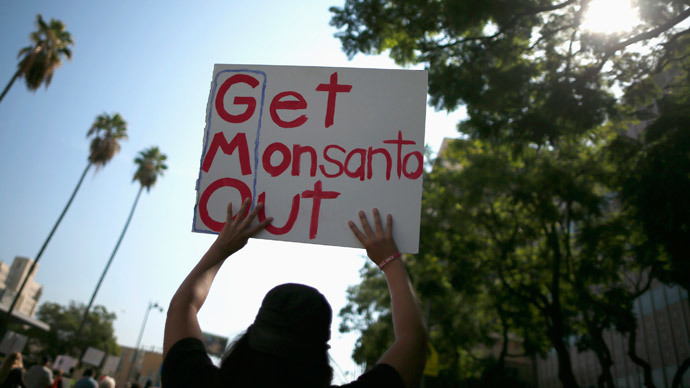GMO labeling bill to face stiff agribusiness opposition after reintroduction in Congress

A federal bill that would mandate the accurate labeling of genetically-engineered ingredients in food or beverages sold in the US has been revived in Congress, the latest for the popular “right to know” movement that faces formidable corporate opposition.
The Genetically Engineered Food Right-to-Know Act is written to “establish a consistent and enforceable standard for labeling of foods produced using genetic engineering, including fish, thereby providing consumers with knowledge of how their food is produced.”
Democrats Rep. Peter DeFazio and Sens. Barbara Boxer and Richard Blumenthal reintroduced the legislation Thursday.
“We cannot continue to keep Americans in the dark about the food they eat,” DeFazio said, according to Food Safety News. “More than sixty other countries make it easy for consumers to choose. Why should the U.S. be any different?”
Thanks to @RepPeterDeFazio for championing #organic label in the 90s and now #GMO food labeling. We can do it! pic.twitter.com/wvjRP6VKAJ
— Center 4 Food Safety (@TrueFoodNow) February 12, 2015
The US Food and Drug Administration would be required to enforce the law. The FDA first allowed the sale and consumption of genetically-modified organisms (GMO) in 1992, stating that bioengineered foods did not meaningfully differ in substance or safety from other foods grown by traditional plant breeding processes.
Opponents of GMO labeling involve major retailers and agribusiness firms that depend on domination of the food supply. Their major argument is that GMO foods, especially corn and soy, have been consumed by Americans for around two decades and have not been shown to have an impact on human health in that time.
While some supporters of GMO labeling concede that human health may not be affected by the direct consumption of GMOs, there are other worries that have pushed the pro-labeling contingent, some of whom are completely anti-GMO, to call for more transparency from the food industry.
Companies like Monsanto and Dow Chemical market their own patented seeds that, given their genetic modification, can be doused with biocides to kill pests and weeds, and which can jeopardize long-term health of the soil and the necessary biodiversity of a local environment that allows for natural pollination and, thus, food security.
Why Prevent Labeling Of #GMO Foods? http://t.co/DLtdkWPb7F#GMOs#label#BanGMOs#Monsanto#food#toxic#Cancerpic.twitter.com/YzgWw6DpN7
— John Loeffler (@jelo1317) February 6, 2015
Monsanto could be about to receive US government approval for its next generation of the Roundup Ready system. The company’s new GMO crops – coupled with a potent biocidal dicamba/glyphosate cocktail – make up what Monsanto has dubbed the 'Roundup Ready Xtend crop system,' designed to trump super weeds that have evolved along with its original Roundup herbicide.
State labeling efforts no match for corporate cash
In recent years, GMO-labeling measures have failed in multiple US states while giving a scare to their corporate opponents. Voters in California and Washington State narrowly rejected ballot initiatives in 2012 and 2013, respectively, though not without dragging the likes of Monsanto, Bayer and Dow Chemical into expensive campaigns to defeat the measures.
Last November, labeling efforts were defeated in Colorado and Oregon, albeit narrowly for the latter state. In what became the most expensive campaign in Oregon’s history, Yes on 92 – the pro-labeling contingent – was outspent $21 million to $9 million by No on 92, which included major agribusiness and biotechnology companies with deep pockets, including Monsanto and DuPont, as well as anti-labeling trade group the Grocery Manufacturers Association.
One labeling effort succeeded in November, in Hawaii’s Maui County, though Monsanto and Dow Chemical quickly sued the county despite voters’ wishes.
Amid a wave of concern over GMO foods sweeping through the US and around the world, agricultural giants lobbying against labeling measures have spent over $100 million fighting the measures nationwide, a sum certain to increase with each passing year.
Beyoncé and #GMO labeling pic.twitter.com/IazoJwMQ63
— Michael Eisen (@mbeisen) February 5, 2015
In response to popular concern over the ramifications of genetically-modified organisms, powerful farming and biotechnology interest groups have joined forces, as RT has previously reported, under the name 'Coalition for Safe Affordable Food' to push a federal voluntary labeling standard for food made with GMOs in an effort to stem the tide of state legislation seeking to mandate labeling.
The Safe and Accurate Food Labeling Act of 2014 -- called the “Denying Americans the Right-to-Know Act” by opponents -- was introduced by Republican Rep. Mike Pompeo, an ally of Charles and David Koch, heads of the powerful multinational corporation Koch Industries. In December, according to reporting by AgriPulse Communications, Pompeo said hoped the bill would see legislative action at the committee level in March or April 2015.
Tell Congress to reject the DARK Act GMOs: http://t.co/LGwaF9DoT0#GMOpic.twitter.com/76n1af8v4I
— Fight Against GMOS (@FightAgainstGMO) February 13, 2015
In 2013 and 2014, there were over 70 GMO labeling bills and ballot initiatives introduced across 30 US states, according to the Center for Food Safety.
Vermont’s governor signed the nation’s first GMO labeling requirement into law in 2014, to take effect in 2016, but a coalition of biotech firms and farmer groups filed a lawsuit to prevent that from happening. Connecticut passed legislation saying it would require labeling, but for the law to go into effect, it required neighboring states whose populations add up to at least 20 million residents to pass similar legislation. Maine passed a labeling bill in 2014, requiring five nearby states, including New Hampshire, to pass similar legislation before its own law takes effect.
According to a study that analyzed research on labeling costs ahead of Oregon’s ballot initiative, mandatory labeling of genetically-engineered foods available to consumers would result in a cost increase of only $2.30 per person each year.











